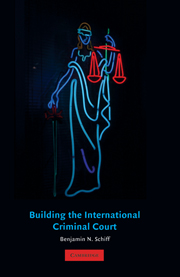Book contents
- Frontmatter
- Contents
- Preface
- Acronyms
- Building the International Criminal Court
- Introduction
- 1 River of Justice
- 2 Learning from the Yugoslavia and Rwanda Tribunals
- 3 The Statute – Justice versus Sovereignty
- 4 Building the Court
- 5 NGOs – Advocates, Assets, Critics, and Goads
- 6 ICC–State Relations
- 7 The First Situations
- 8 Conclusions: The Politics of the International Criminal Court
- Web Sites for Further and Ongoing Information
- Bibliography and Sources
- Index
2 - Learning from the Yugoslavia and Rwanda Tribunals
Published online by Cambridge University Press: 05 September 2012
- Frontmatter
- Contents
- Preface
- Acronyms
- Building the International Criminal Court
- Introduction
- 1 River of Justice
- 2 Learning from the Yugoslavia and Rwanda Tribunals
- 3 The Statute – Justice versus Sovereignty
- 4 Building the Court
- 5 NGOs – Advocates, Assets, Critics, and Goads
- 6 ICC–State Relations
- 7 The First Situations
- 8 Conclusions: The Politics of the International Criminal Court
- Web Sites for Further and Ongoing Information
- Bibliography and Sources
- Index
Summary
Reacting to murderous conflict and genocide in Yugoslavia and Rwanda, the Security Council created the first international criminal tribunals since Nuremberg and Tokyo. At the same time, the ICC Statute discussions continued to percolate in the International Law Commission, among legal experts, and within states and nongovernmental organizations. A community of lawyers, activists, and international organization officials interested in international criminal law congregated around the tribunals and sought to instill their expertise and experience into the construction of the ICC Statute. The leading lesson of the tribunals was that, in contrast to Cold War intransigence, Security Council members could agree to create international criminal tribunals, and then agree on the mechanisms needed to establish and operate them. With help from states, suspects could be apprehended and brought to court. A paramount negative lesson was that state cooperation, especially for providing financial support and for bringing suspects to court, was crucial but not easily obtained. The tribunals struggled to recruit, retain, and manage staff, lawyers, and judges and to meld the skills of people from differing legal and social backgrounds into effective organizations.
Once the tribunals began operating, many people in former Yugoslavia and Rwanda remained suspicious, believing the tribunals were illegitimate, politicized, and biased. Those interested in cooperating with the tribunals feared retribution, witness protection was problematic, and potential witnesses often refused to cooperate. Organizationally highly independent from the rest of the United Nations, the tribunals' management of finances, records, and personnel was chaotic and, in some cases, corrupt.
- Type
- Chapter
- Information
- Building the International Criminal Court , pp. 42 - 67Publisher: Cambridge University PressPrint publication year: 2008



